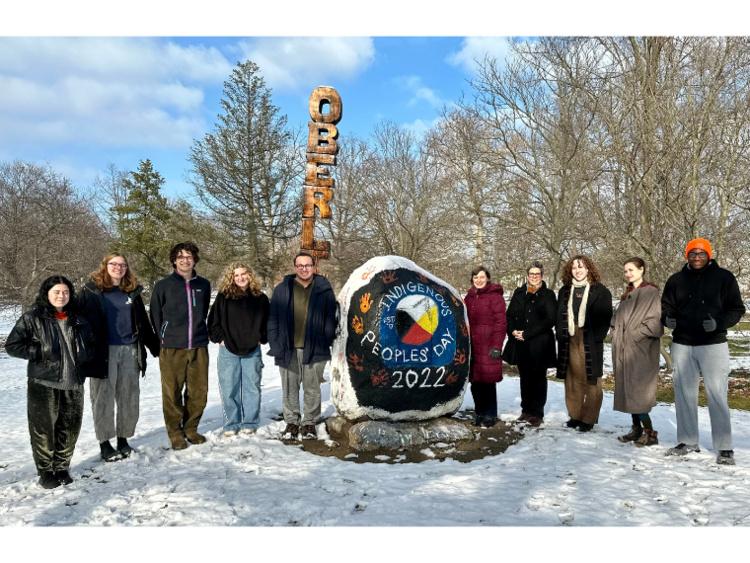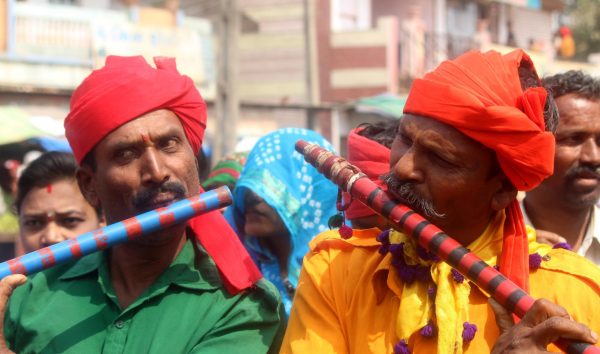Stories of Indigenous Oberlin Amplified in Oral History Project
Photo Courtesy of Oberlin College
Students amplified Indigenous voices during Winter Term
We most often consider the word “history” in a broad context. We are driven to explore the human past in terms of social, political, economic, cultural, and religious developments in an effort to evolve and grow into a better society. While it is, of course, important for us to examine the past from a global perspective, there is a special satisfaction that comes from focusing on individuals. Personal histories allow us to connect and empathize with others and experience the impacts of history in a unique way. A firsthand account of the successes and struggles of others helps us to reflect on our own lives and experiences.
The offer to be interviewed for the Winter Term Oral History Project was such an honor. I suppose I felt that the sharing of history is somehow relegated to icons and heroes of their time. However, I didn’t understand why I was chosen to do this. Sometimes I feel small. I cannot end wars. I cannot clothe or nourish every hungry man, woman, and child. I cannot ease the pain of all who grieve the loss or infirmity of a loved one. I cannot calm the turbulence felt by my hurt, lonely, and broken neighbors across the globe. I suppose I needed to recognize more clearly that I don’t need to worry about being a hero to the world. I need to worry about being a hero to my own family, to the young people who have become a part of my life, and to my own community. Great leaders in history had personal heroes — small people in their lives who touched them and helped to shape them. Perhaps by being part of this project, in some small way, I might make an impact on another who can carry with them my own story in a way that uplifts, guides, or propels them. I might become a personal hero. As the project progressed and I looked upon the faces of the other participants, I was keenly aware that I was in the presence of some of my own personal heroes, people whose advice and knowledge had helped to shape me. These are people who have been important pieces in the puzzle that is reconnecting to my Indigeneity. I began to wonder whether or not they had shared my experience of feeling small.
If one is to understand my family’s journey as reconnecting Haudenosaunee, there first needs to be an understanding of where the disconnect from our cultural identity happened in the first place.
Imagine for a moment armed soldiers riding into your neighborhood and forcing you to hand over your children. Suppose they demand to train your children to be part of a foreign culture and to leave their customs, religion, and even language behind them. It sounds like something out of a horror movie, but it isn’t. It is truth; truth that broke communities and broke down the familial construct of generations of Indigenous families. It is called cultural genocide. The earliest iterations of off-reservation Indian residential schools — assimilation schools — started popping up in the 1600s. In 1891, the American government enacted a “compulsory attendance” law. It wasn’t until 1978 that the Indian Child Welfare Act gave Native parents the legal right to refuse to enroll their children in these schools. My own family is an example of what would have been considered a success story by the American government. My grandma, Helen “Little Star” Starett, married Orville, and did not teach her children her language. She did not sing their songs or share with them the rich culture of her people. She had been taught to be ashamed and to do whatever she could to fit into mainstream society — meaning white society. In order to reclaim the identity of her people, we have opened our hearts and minds and tried in the best way we can to honor who her people are. We take seriously the advice and teachings of Native community members and participate as much as possible in that community. We wish to be a voice that was silenced not so long ago.
Another aspect of being a reconnecting person is the awareness and acknowledgment of a privilege that we have been afforded that many in our community, both past and present, have not. It is a delicate balancing act between being a voice and listening to the chorus of others whose experiences and histories lack any resemblance to our own. It is vital that we hear those histories clearly, without judgment, and honor those who share them.
The Winter Term Oral History Project put on full display the necessity of a connection between the interviewer and the interviewee. By asking meaningful questions and showing genuine interest and concern in the answers, my interviewers were able to put me at ease and allow me to be open and vulnerable about difficult topics. Through the process, I feel reminded of the importance of listening fully to others — not to respond, but to empathize and grow. I am all at once desirous to hear more stories, to spend time with the histories of my own peers and community as opposed to limiting myself to the icons aforementioned. I am spurred to harness the patience, flexibility, and legitimacy of my interviewers and apply it to my eventual interactions. I desire to approach conversation in a more meaningful, productive way. After all, each one of us carries a unique history that has the potential to unknowingly impact or inspire others. I implore any who will heed the advice: Take the time to become both an interviewer and an interviewee, for the tales that are shared and received will enrich your life and ornament your soul in ways you never could have imagined.







